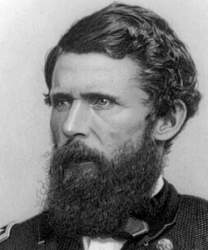Record Data
Source citation
Andrew Johnson, Paul Bergeron (ed), The Papers of Andrew Johnson: Volume 9, September 1865-January 1866 (Knoxville, TN: University of Tennessee Press, 1991), 370-372.
Type
Letter
Date Certainty
Exact
Transcriber
John Osborne, Dickinson College
Transcription date
Transcription
The following text is presented here in complete form, as it originally appeared in print. Spelling and typographical errors have been preserved as in the original.
Washington City, November 11, 1865
To His Excellency the President:
Sir - I desire to call your attention to a certain class of persons in this city (male and female), who are daily visiting the White House, known as
pardon brokers.
My attention was, some time since, called to the individuals referred to; the means employed in the prosecution of their business; and also a number of persons holding positions under the Goverment, &c. I declined, however, to take any official cognizance of the matter, until quite recently, when I discovered that certain females, of very questionable character and reputation, to say the least, were almost daily procuring pardons. These females have advertised or proclaimed themselves in the public hotels and saloons of this city as "Pardon Brokers," asserting that they could procure the pardon of any one applying, in twelve hours.
Some days since an officer of the U.S. Army, who had been convicted at St. Louis, by military court-martial, sentenced to the Penitentiary at Alton, Ill., for two years, but escaped to Canada in 1864, came to Washington to procure his pardon. He was advised to apply to a Mrs. L. L. Cobb, who assured the officer that she could obtain his pardon in twelve hours, for the sum of three hundred dollars, remarking at the same time that she, Mrs. C., would have to pay a portion of said three hundred dollars to certain clerks and others. The officer paid Mrs. Cobb one hundred dollars as retaining fee, taking a receipt for the same, the original of which is in your hands. Mrs. Cobb informed the officer at their first interview, that she had procured or obtained a great number of pardons, but was always compelled to divide the amount received therefor with certain persons holding positions in different departments and bureaus. Mrs. Cobb having failed to procure the pardon within the time mentioned in the above receipt, the officer became dissatisfied, and complained to me that he feared he should lose the one hundred dollars advanced.
After hearing his statement, I feared that Mrs. C. might be engaged with others in forging pardons, as I did not think it possible that a woman of her character could procure a pardon under any circumstances, much less procure it in the time specified in her agreement with the officer. Being desirous, and deeming that the ends of justice would best be subserved, I asked the officer, in case she should succeed in procuring the pardon, to pay the remaining two hundred dollars in such funds as could be identified; accordingly I gave the officer four fifty-dollar treasury notes, and marked them. The same evening the officer went to Mrs. Cobb's room, No. 20 Avenue House, paid the two hundred dollars, taking Mrs. Cobb's receipt therefor. I then went to Mrs. Cobb's room, and required her to give me the two hundred dollars, which she did. I then asked her and her husband to accompany me to my office immediately. The same evening I took the receipt and contract of Mrs. Cobb to you. The pardon was found in Mrs. Cobb's room, and, on inquiry, I found it had been delivered to her before the oath of amnesty had been made, as required by law. Mrs. C. remained at my office until nearly eleven o'clock, when I discharged her and her husband, and they returned to the Avenue House the same evening. During my conversation with her, she made a long statement, claiming that she was not the only female engaged in procuring pardons for pay, &c. The pardon referred to and procured by Mrs. Cobb was in the name of Clarence J. Howell, a name assumed for the occasion. When we take into consideration the notorious bad character and reputation of this woman (Mrs. Cobb) - her conduct while at the Executive mansion, which is well known to nearly every employee at the White House - her public boastings that she could procure pardons at all times quicker than any other person in Washington - that she has (if her own statement can be relied upon) procured a larger number of pardons, through the assistance of certain attaches of the different departments - I trust I shall be pardoned for calling your attention to the matter, in official statement of the facts in regard to Mrs. Ella B. Washington, another female pardon broker, and the person of whom I spoke at our interview not long since. I beg leave to say that she contracted to procure the pardon of one John Kelly, as appears from the receipt, the original being in my possession.
The pardon was not forwarded, however. I know but little of Mrs. W.'s previously character. She is, however, the wife or widow of Lewis B. Washington, heretofore known as one of the most bitter and uncompromising haters of our Government. There are many other important facts partially brought to light by this investigation, which go to show conclusively that a system of manipulation and corruption is being practised, by persons holding official positions under the Goyernment, in connection with the procuring of pardons.
I am, Sir, most respectfully, your obedient servant,
(Signed) L. C. Baker,
Brigadier-General and Provost-Marshal War Department.
Images
Events
Major Topics
People
Recipient



